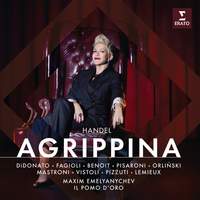Recording of the Week,
Handel's Agrippina starring Joyce DiDonato
Much like its anti-hero Nerone by the end of the opera, Handel’s satirical game of thrones Agrippina is enjoying its day in the sun at the moment, with the work’s Metropolitan Opera premiere coming up next week following a Covent Garden production last autumn, and today brings a starrily-cast new recording on Erato which delivers everything it promises on paper and then some.
 Common to all three projects is Joyce DiDonato as the scheming Roman matriarch prepared to trample over all and sundry to install her son on the throne, and on this studio recording (made in-between concert performances last May) she’s already completely inside the role, whether eating spineless courtiers for breakfast, tearing a strip off her hapless offspring, or unravelling à la Lady Macbeth in the astonishingly-sung monologue ‘Pensieri, voi mi tormentate’. Her thrilling, expressive coloratura and imperious top notes are as on-point as ever, but what makes this interpretation special is her sheer plausibility – only rarely does she allow Agrippina’s duplicity to bubble to the surface, and the few moments where the mask does slip (a stab of chest-voice here, a spat consonant there) register all the more potently for it.
Common to all three projects is Joyce DiDonato as the scheming Roman matriarch prepared to trample over all and sundry to install her son on the throne, and on this studio recording (made in-between concert performances last May) she’s already completely inside the role, whether eating spineless courtiers for breakfast, tearing a strip off her hapless offspring, or unravelling à la Lady Macbeth in the astonishingly-sung monologue ‘Pensieri, voi mi tormentate’. Her thrilling, expressive coloratura and imperious top notes are as on-point as ever, but what makes this interpretation special is her sheer plausibility – only rarely does she allow Agrippina’s duplicity to bubble to the surface, and the few moments where the mask does slip (a stab of chest-voice here, a spat consonant there) register all the more potently for it.
The decidedly rotten apple of her eye is Argentine countertenor Franco Fagioli, who sang the role in London to mixed reviews, but to my mind makes a terrific showing here: it’s always going to be a love-it-or-loathe-it voice (as regular readers are probably in little doubt, I sit squarely in the former camp), but his trademark rapid vibrato and machine-gun coloratura convey Nerone’s frightening volatility in all its monstrous glory, and he sounds far more at ease singing around the top of the stave these days than he did a few years ago as Mozart’s Idamante. (Try his opening siciliano ‘Col saggio tuo consiglio’ for size). His propensity for flamboyant ornamentation is largely kept on ice until the third act (one of the joys of this set is the way that embellishments, both vocal and instrumental, are always harnessed in service of the drama), but when he’s finally allowed off the leash for his temper-tantrum ‘Come nube’ the effect is electrifying, sustained top C and all.
His character might cede the imperial garlands to Nerone, but the vocal laurels ultimately belong to Jakub Jósef Orliński, who turns in a performance of real emotional depth as Ottone, the straight man to Fagioli’s pantomime villain and arguably the only decent person in the opera: despite the glamour and glitz surrounding the young Polish countertenor’s rapid rise to fame, it’s the understated integrity of his singing that steals the show here, and the range of colours which he summons for his great lament ‘Voi che udite’ rivals DiDonato’s ‘Pensieri’ for introspective intensity. In an opera with such a preponderance of medium-high voices, it helps that his timbre is so immediately distinguishable from that of Fagioli, and indeed that Fagioli contrasts so strongly with DiDonato, whose music sits in much the same register – on rival recordings it’s occasionally an effort to tell characters apart, but I guarantee you’ll need no recourse to the libretto on that count here (though props to Erato for including full texts and translations).
As the object of pretty much everybody’s ardour, Poppea, the French soprano Elsa Benoit is a credible adversary for Agrippina in every respect: less cutesy and more voluptuous than Sunhae Im on René Jacobs’s 2011 recording, she brings genuine pathos as well as allure to the role, so that the boudoir shenanigans in Act Three as she plays off her various suitors against one another crackle with real and present danger rather than descending into Benny Hill territory.
 At the helm is the young Russian conductor and harpsichordist Maxim Emelyanychev, whose long-standing rapport with both Il Pomo d’Oro and several of his singers (he’s recorded arias from the opera with both DiDonato and Orliński on recital albums) is readily apparent. Despite his reputation as something of a speed-freak, he never strikes me as driving the music too hard, and his imaginative, often witty continuo contributions always enhance rather than intrude.
At the helm is the young Russian conductor and harpsichordist Maxim Emelyanychev, whose long-standing rapport with both Il Pomo d’Oro and several of his singers (he’s recorded arias from the opera with both DiDonato and Orliński on recital albums) is readily apparent. Despite his reputation as something of a speed-freak, he never strikes me as driving the music too hard, and his imaginative, often witty continuo contributions always enhance rather than intrude.
My budget may not stretch to a jaunt to The Met next month, but this wonderfully vivid set is ample recompense.
Joyce DiDonato (Agrippina), Elsa Benoit (Poppea), Luca Pisaroni (Claudio), Franco Fagioli (Nerone), Jakub Józef Orliński (Ottone), Andrea Mastroni (Pallante), Carlo Vistoli (Narciso), Biagio Pizzuti (Lesbo), Marie-Nicole Lemieux (Giunone)
Il Pomo d'Oro, Maxim Emelyanychev
Available Formats: 3 CDs, MP3, FLAC, Hi-Res FLAC



